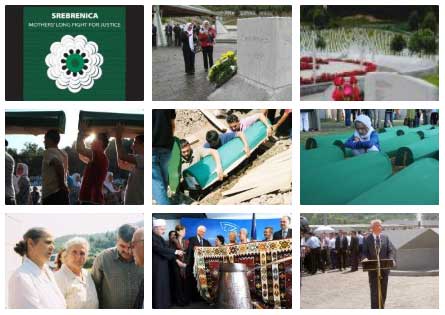Srebrenica genocide victims'
long fight for justice
An open wound
The Srebrenica genocide marked one of the darkest pages of European history. If we want to write a brighter future, we must remember what happened and promote awareness and education about the Srebrenica genocide, and fight against genocide denial or distortion or falsification of that part of our history. We must acknowledge the suffering of the survivors and of the victims’ families. We must make their struggle for justice our goal.
- Dunja Mijatović, Council of Europe Commissioner for Human Rights
Commemorative video about the Srebrenica genocide produced by Tarik Samarah
In just a few days in July 1995, 8372 Bosniaks, mainly men and boys, were brutally killed in and around the Bosnian city of Srebrenica. Nearly 30 000 women, children and elderly people were forcibly expelled in a massive ethnic cleansing campaign, making this event the biggest war crime to take place in Europe since the end of the Second World War.
In August 2001 the International Criminal Tribunal for the former Yugoslavia (ICTY) concluded that a crime of genocide was committed in Srebrenica. Ever since, the survivors and the victims’ families have been fighting to obtain justice and recognition.
-
fight against impunity
-
genocide denial
-
missing persons
-
reparations
-
education
Resources
Recent resources 
- Opinion: Genocide denial concerns us all
- Srebrenica genocide: a mirror for all Europeans
- Srebrenica: disumanizzare l'altro
- 24 years on, Srebrenica still calls for justice: Op-ed
- Islamophobie : les leçons du génocide de Srebrenica
- We must not forget Srebrenica
- Bosnia and Herzegovina authorities should spare no effort to build a truly cohesive society and effectively protect media freedom
- Victims of the Srebrenica genocide deserve respect and support
- Addressing the needs of the victims of the Srebrenica genocide must be the priority
- Bosnia and Herzegovina should accelerate its efforts to establish a more just society
- Srebrenica Summer University 2013
- Transitional justice in the context of European convention obligations: the right to life and dealing with the past
- Missing persons and victims of enforced disappearance in Europe
- Post-war justice and durable peace in the former Yugoslavia
- The long fight for justice of the Mothers of Srebrenica and Zepa
External resources 
- International Criminal Tribunal for the former Yugoslavia (ICTY)
- ICTY film "Srebrenica: no room for denial"
- Judgement of the International Court of Justice of 26 February 2007 on the Application of the Convention on the Prevention and Punishment of Genocide (Bosnia and Herzegovina v. Serbia and Montenegro)
- Srebrenica Memorial Centre
- Remembering Srebrenica
- Movement of Mothers of Srebrenica and Žepa enclaves
- International Commission on Missing Persons



